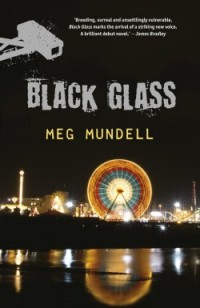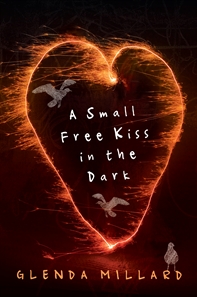Reading Melbourne
I’ve been home now for a few days. After spending some weeks prodigally gadding about with other cities, I’ve needed some help against my post-holiday blues. Don’t get me wrong: I’ve always lived in Melbourne, and it has my love for now and ever. But its welcoming embrace has been winter-chilly, its kissing cheek cold, and I have needed a bit of encouragement to fall back in love with it.
 Luckily, Melbourne has no shortage of storytellers to assist with this reunion. In particular, there have recently been a few future-Melbourne books, extrapolating on existing geography and concerns to imagine a city strange and yet familiar. I recently had the pleasure of interviewing Meg Mundell, who was born in New Zealand but has lived in Melbourne for over a decade. Meg is the author of Black Glass, which envisions a near-future Melbourne (although AFL is still in evidence as the favourite sport, characters remember Cate Blanchett as an actress of yore).
Luckily, Melbourne has no shortage of storytellers to assist with this reunion. In particular, there have recently been a few future-Melbourne books, extrapolating on existing geography and concerns to imagine a city strange and yet familiar. I recently had the pleasure of interviewing Meg Mundell, who was born in New Zealand but has lived in Melbourne for over a decade. Meg is the author of Black Glass, which envisions a near-future Melbourne (although AFL is still in evidence as the favourite sport, characters remember Cate Blanchett as an actress of yore).
I read Black Glass a few months ago, but it popped up in my head again and again on my travels. A common topic in travellers’ conversations is politics; I did some patient explaining about the 2010 leadership spill to New Yorkers in dive bars, and I saw the church in Iceland that Italian Prime Minister Silvio Berlusconi disliked enough to suggest it should be bulldozed. Among all this talk of politicians, I couldn’t help but recall the government that Meg predicts for us in her novel. People who don’t have identity documentation, including children like Black Glass protagonists Tally and Grace, are unable to work legally, so they are forced into dangerous work on society’s fringes.
Not only is the government inhumanely blind to these people, but it also operates much like a corporation with a lot to lose. One character, Luella, a government official, trades newsworthy tidbits for control over how new policies will be represented by her reporter allies. When I asked Meg what Luella’s government wanted, she said: ‘To be re-elected’. This comment brought to mind not something from our possible future, but something fixed in our history: last year’s national election, in which Labor’s pre-election performance was criticised for its hollow tactics. But it’s not all doom and gloom in Black Glass. Lost as they are, Tally and Grace meet some people who help them along the way.
And it’s this idea of support and friendship for marginalised — indeed, homeless — people that first sparked the idea for Glenda  Millard’s A Small Free Kiss in the Dark, a young adult book that has been shortlisted for and won many awards. Young Skip runs away from school only to find himself in a city suddenly besieged by war. He befriends a homeless man named Billy, and an even younger boy called Max. Together they help each other to survive the onset of planes, soldiers and isolation.
Millard’s A Small Free Kiss in the Dark, a young adult book that has been shortlisted for and won many awards. Young Skip runs away from school only to find himself in a city suddenly besieged by war. He befriends a homeless man named Billy, and an even younger boy called Max. Together they help each other to survive the onset of planes, soldiers and isolation.
Though A Small Free Kiss in the Dark is set in a city that is never named, it contains hints that a Melburnian would easily take. I was moved by the little band’s pursuit of refuge through underground train passages, in a state library and in a fun fair that I had no trouble imagining as an abandoned Luna Park.
In non-fiction Melbourne reads, I’m looking forward to Sophie Cunningham’s Melbourne, due out in August.
What are your favourite Melbourne books?
Posted on 11 July 2011, in MWF staff musings and tagged fiction, Glenda Millard, Meg Mundell, Melbourne, novels, speculative fiction, young adult. Bookmark the permalink. 2 Comments.
Helen Garner, Monkey Grip, The Children’s Bach.
Maureen McCarthy, Queen Kat, Carmel & St Jude get a Life
Eliot Perlman, Three Dollars
Great picks — I have bought three or four copies of Queen Kat, Carmel and St Jude Get a Life because I kept giving it to my friends when I was a teenager. I always think about that book when I pass Canning Street.